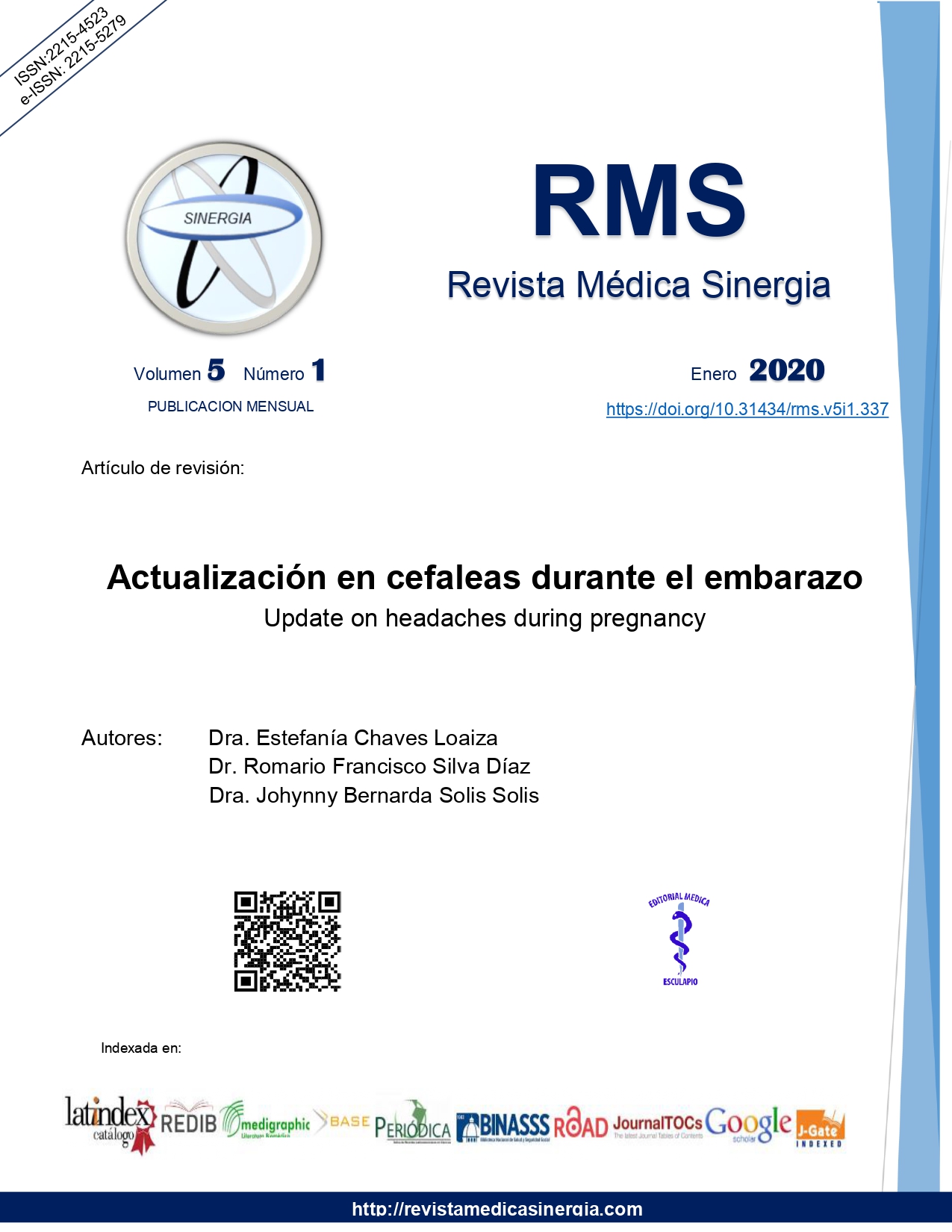Resumen
La cefalea es uno de los motivos de consulta principales en los servicios de salud, y su frecuencia aumenta en la edad reproductiva y hasta puede ser incapacitante. Actualmente, se considera el embarazo por si solo un signo de alarma en las cefaleas. Éstas pueden ser de causas primarias o secundarias, siendo las primeras las más frecuentes. Sin embargo, durante el embarazo hay causas secundarias que cobran mayor importancia por lo que debe ser importante saber reconocer cada una de ellas. El diagnóstico es clínico, basado en una buena anamnesis y un buen examen físico. Los estudios de imagen deben ser enviados solo cuando realmente se ameriten, ya que son costo efectivos y enlentecen el diagnóstico. El abordaje terapéutico siempre es un reto en este grupo de pacientes, ya que se debe procurar no causar daño fetal. No existen medicamentos de categoría A para esta patología en específico, y la medida de tratamiento farmacológica más recomendada es el uso de acetaminofén, aunque también son importantes las medidas no farmacológicas.
Palabras clave
Citas
Buitrago J, Murillo R, Meneses A, Rivera P, Ascencio H, Bosch R. Frecuencia y factores de riesgo asociados a la cefalea postparto en el Hospital universitario Erasmo Meoz de San José de Cúcuta. Revistas.unipamplona.edu.co. 2019 [accesado 22 de Octubre 2019]. Disponible en: http://revistas.unipamplona.edu.co/ojs_viceinves/index.php/INBIOM/article/view/2165
Moreno K, Fung M. Manejo de la cefalea en la paciente embarazada que acude al servicio de emergencias: Revista medica de Costa Rica y Centroamérica. 2014, LXXI (611): 417-419. [accesado 09 Sep. 2019]. Disponible https://www.medigraphic.com/pdfs/revmedcoscen/rmc-2014/rmc143i.pdf
Buonanotte C, Buonanotte M. Migraña aguda en embarazo: oportunidades terapéuticas. 2019 [accesado 22 de Octubre 2019]. Disponible: https://www.sciencedirect.com/science/article/abs/pii/S1853002816300325?via%3Dihub
Negro A, , Delaruelle Z, Ivanova TA, Khan S, Ornello R, Raffaelli B, Terrin A, Reuter U, Mitsikostas DD. Headache and pregnancy: a systematic review. The Journal of Headache and Pain. 2017 Oct 19;18(1). https://doi.org/10.1186/s10194-017-0816-0
Schoen J, Campbell R, Sadosty A. Headache in Pregnancy: An Approach to Emergency Department Evaluation and Management. Western Journal of Emergency Medicine. 2015 03 23;16(2):291-301. https://doi.org/10.5811/westjem.2015.1.23688
Doblas Gómez P, Martín Orlando J, López Díaz A. Migraña y gestación. Revisión bibliográfica. 2019 [accesado 18 de Octubre 2019]. Disponible en: https://www.sciencedirect.com/science/article/abs/pii/S0210573X14000227?via%3Dihub
Raffaelli B, Siebert E, Körner J, Liman T, Reuter U, Neeb L. Characteristics and diagnoses of acute headache in pregnant women - a retrospective cross-sectional study. The Journal of Headache and Pain. 2017 [accesado 22 October 2019];18(1). https://doi.org/10.1186/s10194-017-0823-1
Sperling JD, Dahlke JD, Huber WJ, Sibai BM. The Role of Headache in the Classification and Management of Hypertensive Disorders in Pregnancy. Obstetrics & Gynecology. 2015 08;126(2):297-302. https://doi.org/10.1097/aog.0000000000000966
Robbins M, Farmakidis C, Dayal A, Lipton R. Acute headache diagnosis in pregnant women. Neurology. 2015;85(12):1024-1030. https://doi.org/10.1212/WNL.0000000000001954
Do TP, Remmers A, Schytz HW, Schankin C, Nelson SE, Obermann M, Hansen JM, Sinclair AJ, Gantenbein AR, Schoonman GG. Red and orange flags for secondary headaches in clinical practice. Neurology. 2018 Dec 26;92(3):134-144. https://doi.org/10.1212/wnl.0000000000006697
MacGregor EA. Migraine in pregnancy and lactation. Neurological Sciences. 2014 05;35(S1):61-64. https://doi.org/10.1007/s10072-014-1744-2
Sandoval Paredes J, Sandoval Paz C. Uso de fármacos durante el embarazo. 2019 [accesado 9 de Setiembre 2019]. Disponible en: http://www.horizontemedico.usmp.edu.pe/index.php/horizontemed/article/view/732
Vera Carrasco, O. (2015). Uso de fármacos en el embarazo. Revista Scielo Bolivia Available at: http://www.scielo.org.bo/pdf/rmcmlp/v21n2/v21n2_a10.pdf Accesado 11 Setiemre. 2019
Wells RE, Turner DP, Lee M, Bishop L, Strauss L. Managing Migraine During Pregnancy and Lactation. Current Neurology and Neuroscience Reports. 2016 03 21;16(4). https://doi.org/10.1007/s11910-016-0634-9
Marchenko A, Etwel F, Olutunfese O, Nickel C, Koren G, Nulman I. Pregnancy Outcome Following Prenatal Exposure to Triptan Medications: A Meta-Analysis. Headache: The Journal of Head and Face Pain. 2015 [accesado 9 de Octubre 2019];55(4):490-501. https://doi.org/10.1111/head.12500
Govindappagari S, Grossman TB, Dayal AK, Grosberg BM, Vollbracht S, Robbins MS. Peripheral Nerve Blocks in the Treatment of Migraine in Pregnancy. Obstetrics & Gynecology. 2014 Dec;124(6):1169-1174. https://doi.org/10.1097/aog.0000000000000555
Pearson SM, Burish MJ, Shapiro RE, Yan Y, Schor LI. Effectiveness of Oxygen and Other Acute Treatments for Cluster Headache: Results From the Cluster Headache Questionnaire, an International Survey. Headache: The Journal of Head and Face Pain. 2019 01 11;59(2):235-249. https://doi.org/10.1111/head.13473
Buettner C, Nir R, Bertisch S, Bernstein C, Schain A, Mittleman M et al. Simvastatin and vitamin D for migraine prevention: A randomized, controlled trial. Annals of Neurology. 2015 [accesado 18 Octubre 2019];78(6):970-981. https://doi.org/10.1002/ana.24534


